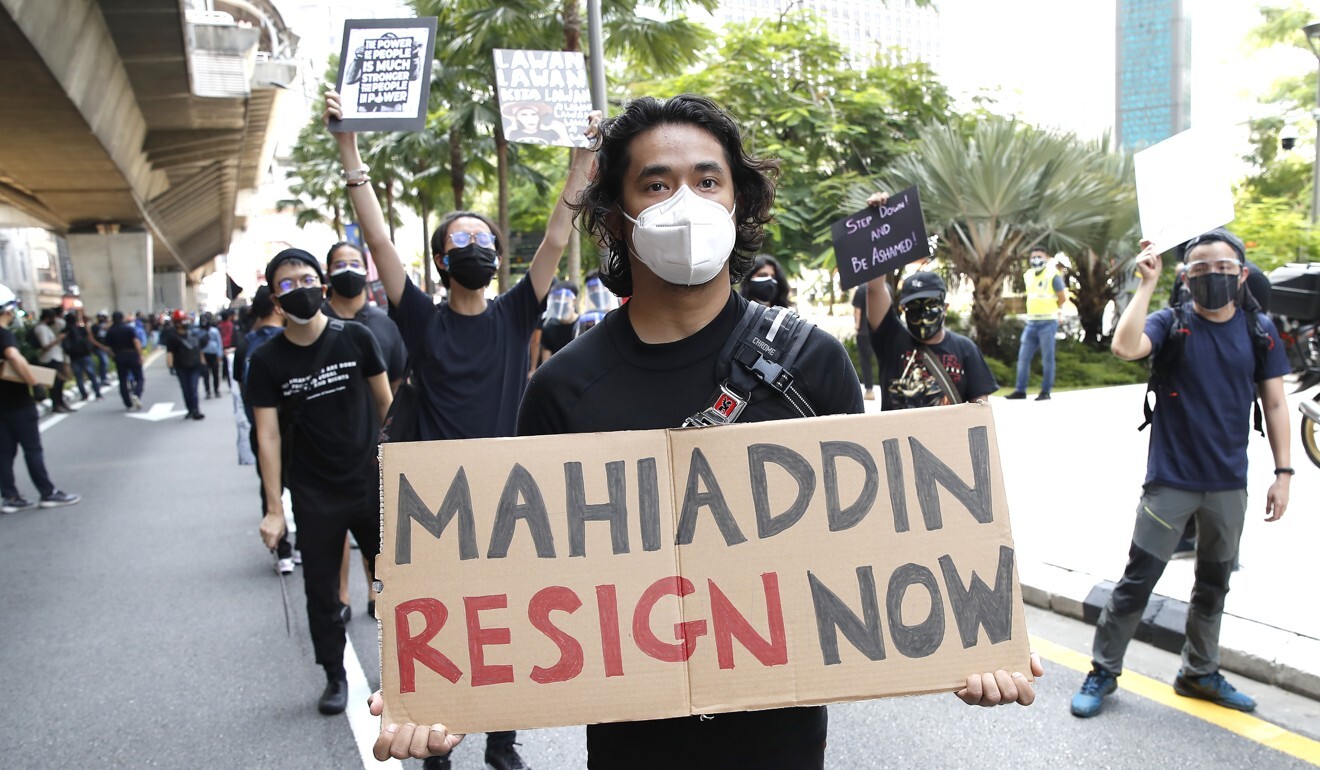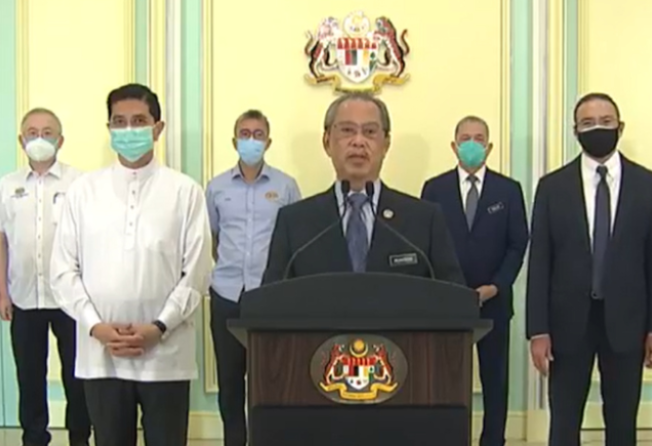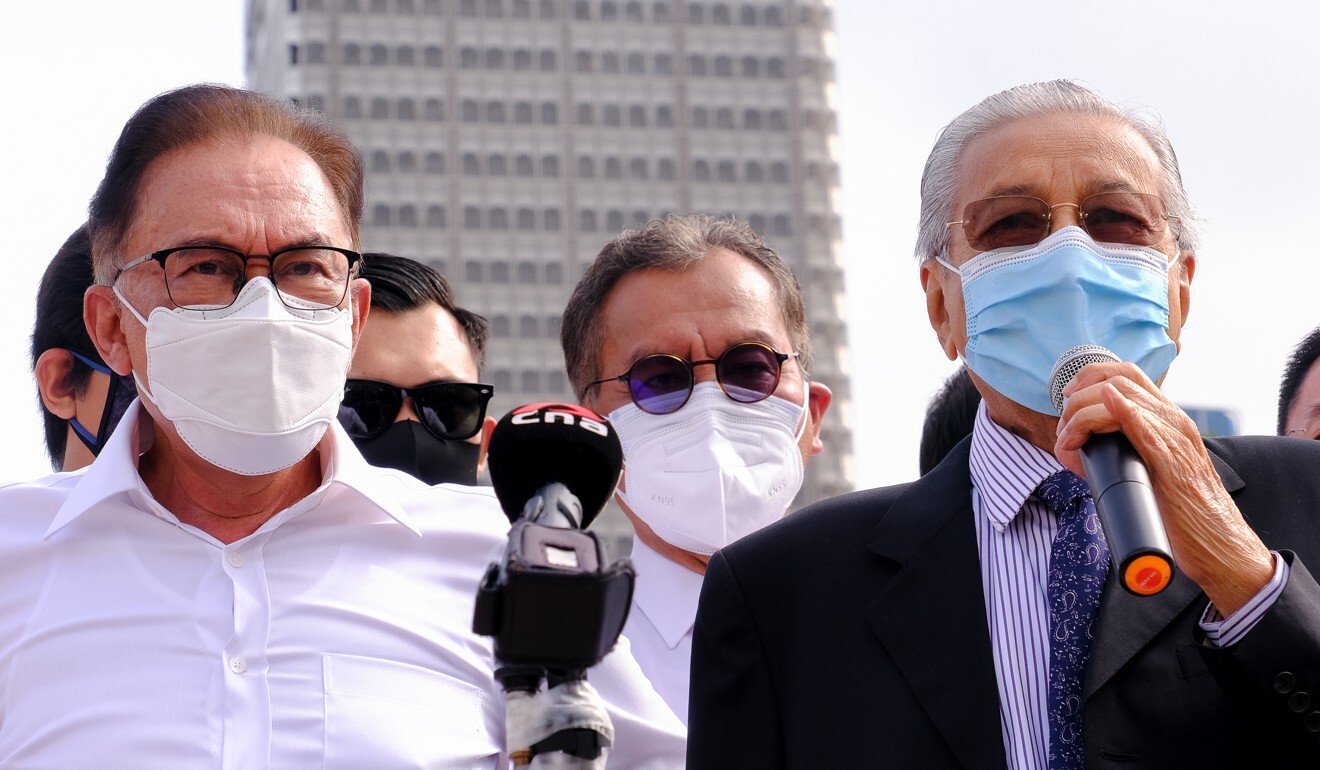
Malaysia’s political crisis: opposition accuse embattled PM Muhyiddin of ‘corruption’ after offer of sweeping concessions, promise of poll by July 2022
- In a last-ditch plea before September’s no-confidence vote, Muhyiddin pledged to hold polls by July 2022 and support institutional reforms
- The opposition Pakatan Harapan says Muhyiddin is now obliged to resign as the proposal was a ‘confession’ that he lacked majority parliamentary support

Malaysia’s disparate opposition groups, including the former ruling alliance Pakatan Harapan, on Friday uniformly rejected Prime Minister Muhyiddin Yassin’s offer of sweeping concessions and fresh polls by next July in exchange for support in an upcoming vote of no confidence.
The Pakatan Harapan bloc led by Anwar Ibrahim said Muhyiddin’s proposal in a televised address earlier in the evening was “the first time in history where a prime minister without legitimacy made a blatant offer of corruption broadcast to all Malaysian citizens”.
“His address was a confession that the government has lost majority legislative support,” Pakatan Harapan’s top leadership council said in a statement.
“Thus, Pakatan Harapan has decided to reject these insincere proposals by Muhyiddin that should have been made earlier rather than at the end of his political life,” the bloc said.
It reiterated its position that the 73-year-old leader was obliged to resign given clear indications that he had lost the confidence of a majority of MPs.
Muhyiddin in a last-ditch plea before the September 7 vote of no confidence had offered a deal that included a proposal for Anwar to be accorded the status and privileges of a senior minister – a position currently held by only Muhyiddin’s top lieutenants.
As part of the deal, Muhyiddin said his Perikatan Nasional alliance would also reach out to the country’s various political parties next week to strike a confidence and supply agreement that will help it win the floor test and keep it in power until the new polls.
“We have reached a consensus to consult with the leaders of parties outside [the ruling alliance] to approve the confidence motion for the prime minister in parliament,” Muhyiddin said in the Friday evening speech, flanked by key ministers.
“This will enable the current government to continue managing the pandemic until it is time for elections to be held to restore the mandate to the people,” he said.

Opposition lawmakers who have complained of lacking funds to deal with the economic effects of the Covid-19 pandemic will also receive the same 3.5 million ringgit (US$830,000) annual federal allocation as government MPs, up from 100,000 ringgit currently.
As part of the deal, Muhyiddin said the government – if victorious in the September floor test by a two-thirds majority – was also ready to table new laws that the opposition had campaigned for. These included limiting the prime minister to two terms in office, reducing the voting age from 21 to 18 and a law to prevent defections from political parties.
Apart from Pakatan Harapan, smaller anti-government political parties also denounced Muhyiddin’s proposal late on Friday and urged him to “resign honourably”.
Political analyst Bridget Welsh said Muhyiddin’s plea on Friday publicised what was being discussed behind the scenes.
The aim of the proposal was to “divide the opposition”, the long-time Malaysian politics observer said, adding that a confidence and supply pact was “less tenable to both opposition and their political base given Muhyiddin‘s poor governance record”.
Oh Ei Sun, a senior fellow with the Singapore Institute of International Affairs, said by pitching the deal, Muhyiddin was in effect admitting he no longer had the backing of a majority of MPs.
He “should thus honourably step down as prime minister as it is not up to him to discern if any other leader is in command of a majority,” Oh said.
The former political operative questioned the prime minister’s pledge to back the opposition’s institutional reform goals. He noted that Muhyiddin had failed to make these changes in the 17 months he has been in power even though the opposition would have backed him if he had done so.
“But he did not, so his sincerity in offering the olive branch is in serious doubt,” Oh said.
The reduction of the voting age from 21 to 18 has already been sanctioned by parliament through a constitutional amendment, but Muhyiddin’s administration has thus far dragged its feet on operationalising the policy change.

The prime minister was staring at defeat in the September 7 vote of no confidence following defections from the powerful United Malays National Organisation (Umno) that backed him. He has however defied calls to quit, and last week insisted that he continued to enjoy majority legislative support even after the crossovers.
The government has for months resisted any form of voting in parliament that would show the true state of its legislative support, but Muhyiddin relented to the upcoming vote following pressure from the country’s constitutional monarch, Sultan Abdullah Sultan Ahmad Shah.
A tally by local media put the prime minister as having the backing of 105 MPs out of 220 lawmakers, six short of a simple majority.
The anti-Muhyiddin camp however does not have a unified stance on who should succeed Muhyiddin, a point the incumbent stressed in his speech.
Pakatan Harapan, led by Anwar, has 88 MPs and earlier on Friday had urged all anti-Muhyiddin lawmakers to back the veteran politician as the country’s next leader.
Anwar however is a polarising figure in some circles, and the likes of the elder statesman Mahathir Mohamad – Anwar’s on-off rival – have been adamant that he is not suited for the prime ministership.
Muhyiddin gained power last March after staging a political coup against Pakatan Harapan, shock victor of the 2018 election. He was part of Pakatan Harapan but defected and joined hands with Umno – which ruled the country for six decades – over concerns that the new government was neglecting the concerns of majority Malays.
The political impasse is taking place in the throes of a Covid-19 outbreak that is on a worse trajectory than India’s devastating surge in May.
Observers said the reaction within Umno to Muhyiddin’s proposals was key to what lies next. The party has 38 MPs who are divided over whether to back Muhyiddin. Among the Umno MPs opposed to Muhyiddin are the corruption-tainted ex-prime minister Najib Razak and his former no. 2, Ahmad Zahid Hamidi.
Both are on trial for various corruption cases but remain politically influential.
In recent weeks, both have blamed Muhyiddin’s leadership for the country’s mismanagement of the Covid-19 crisis.
In his speech, Muhyiddin said he was making overtures to the opposition partly to ensure that “kleptocratic groups” did not take power in the country.
James Chin, of the Asia Institute at Australia’s University of Tasmania, said the hardline positions of Najib and Zahid against Muhyiddin would make it tricky for their faction of Umno to back the unity proposal.
Nadzri Noor, a political analyst with the National University of Malaysia, dismissed the proposal as too little, too late. “Muhyiddin looks like he is out of cards to play to stay in power after failing to get opposition MPs to defect … the Perikatan Nasional government also does not seem to have the backing of the palace,” the analyst said.